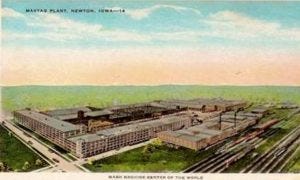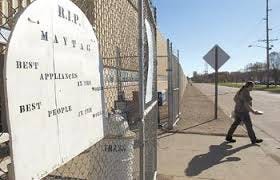Iowa: If you build it, workers will come.

John Kinsella: Is this heaven?
Ray Kinsella: It's Iowa.
John Kinsella: Iowa? I could have sworn this was heaven.
--Field of Dreams (1989)
***
Did you know that in Iowa--yes, heavenly, heart-of-the-corn-belt Iowa--hogs outnumber people 4 to 1? That's 12 million hogs to 3 million people, in case you’re wondering. And yet in 1978, when then-emerging Canadian author W.P. Kinsella lived and wrote in Iowa City, he didn’t wax poetic about hogs. A graduate student in the University of Iowa’s Writers’ Workshop, Kinsella (who passed away in 2016) crafted a story called Shoeless Joe. Set in the cornfields of Iowa, based in part on the Black Sox Scandal of the 1919 World Series, the novel explored the themes of afterlife and redemption. “It’s not so much about baseball,” a book reviewer for the Philadelphia Inquirer wrote, “as dreams, magic, life and what is quintessentially American.” A few years after the book’s 1982 publication, Hollywood came calling. Shoeless Joe became the Academy Award-nominated hit film, Field of Dreams.

As an avid reader and moviegoer, I say thank goodness for the Iowa Writers' Workshop, one of the finest graduate level creative writing programs in the country (if not the world), whose faculty and graduates have written countless literary gems and received 28 Pulitzers. Thank goodness for Kinsella's fine writing, and for movie adaptations that entertain us, touch our hearts; that put us in, um, hog heaven. Thank goodness, too, for F.L. Maytag and his Iowa-made washing machines. Stay with me here.
My dad used to talk about how, in this crazy, entrepreneurial, capitalist country of ours, we are all connected. To remain a free, productive nation with a healthy middle class, employers owed loyalty to their workers. He would say these things each year as my siblings and I tried to scarf down our morning Corn Pops as prep for the dreaded Iowa Test of Basic Skills. It wasn't a good time to discuss the unintended consequences of globalization. Hearing Dad mutter "...and I'm tellin' ya kids...it ain't pretty...goddamn country's going to hell in a hand-basket..." didn't help. But now I finally get what he meant.
From what I've read, F.L. Maytag of Newton, Iowa exemplified loyalty and connectedness to workers. Parks, affordable homes. These added to his employees' quality of life and therefore mattered to him. Even in retirement, he regularly visited the enormous Maytag factory in Newton, chatted with the workers and asked: "Is everybody happy?" When he died in 1937, "an estimated 10,000 factory workers and salesmen formed a line five blocks long to observe the casket processional."
In 1941, five years after its founding, the Iowa Writers' Workshop needed financial help. Its second director, poet Paul Engle, realized the workshop had the potential to expand, to draw into its community gifted authors from all over the globe. Born and raised in Iowa, Engle reached out to local businesses and manufacturers. Maytag (and others) stepped up to the plate.

For the next 20 years the folks at Maytag in Newton (then known as “the washing machine capital of the world”) did their part to help keep the Iowa Writers’ Workshop financially stable. I wonder if Writers' Workshop participants realized--as they crafted stories and landed publishing deals and went on to lead students in writing workshops all over the country--that they shared a connection with thousands of Maytag employees working the lines, making washing machines, earning middle class wages.

But over time, Maytag floundered. First came the cheaper imports. Then the struggle to compete, followed by company missteps. A damaged reputation. Losses. At its peak, Maytag employed 4,000 workers in Newton. By October 27, 2007, everything had changed. From CBS News:
The last washers and dryers rolled off Maytag assembly lines here Thursday and the 550 workers who built them left the 2 million-square-foot factory for the last time, ending a century of appliance manufacturing in Newton under the iconic brand name.
For many workers, it was a sad parting with a company that has provided for their families over generations. Worries had mounted since May 10, 2006, the day officials at Whirlpool Corp., which bought Maytag last year, unveiled plans to close the Maytag corporate headquarters and the local factory that made washers and dryers, leaving about 1,800 local workers to find other jobs…
Factory workers develop close friendships, many co-workers become like family, said Tootie Samson, 47. "It's definitely a death of sorts. A death to a lot of people's lifestyle...How can the people that allowed this to happen live with themselves?" she said.
Many workers remaining have never worked anywhere else and a large number of them have just a high school education. Finding a job that pays $30,000 to $40,000 with good benefits will be tough…
UAW Local 997 President Ted Johnson said eliminating the Newton factory is part of a "widespread epidemic" in the United States of corporations cutting union jobs for lower paying jobs that threaten the middle-class way of life.
"It's just wrong," he said.
To this day some consumers say they would rather purchase used Newton-made Maytags on eBay than buy the new Whirlpool version of the brand that's sold today. Not a bad idea. My mother-in-law, now 96, bought her Maytag washer in 1970-something. It still works great. Her purchase back then rippled across the economy from California to Iowa, helping pay Maytag workers’ salaries, helping fund the Writers’ Workshop; helping folks purchase houses and cars; helping families save up for their kids’ college educations. On and on it went. Until it stopped.

Currently a handful of tenants rent out space in a fraction of the otherwise empty, 2 million-square-foot Maytag factory in Newton. State subsidies and a plethora of other taxpayer-funded incentives convinced Arizona-based TPI Composites to build a wind turbine factory in the former Maytag company town. Through a retraining program, some former Maytag line workers have successfully transitioned to their new jobs making 187-foot-long wind turbine blades. They don’t earn as much as they once did making washing machines for Maytag, but to borrow from W.P. Kinsella: If you build it, Iowa’s workers will come. They want to work.
Before we move on, let's not forget a different Newton-based company that, happily, will never fall into the corporate clutches of Whirlpool: Maytag Dairy Farms.


From the company's website:
"In 1919 E.H. Maytag, the son of Maytag Appliance company founder F.L. Maytag, purchased a single Holstein cow to provide fresh clean milk to his children. E.H. quickly developed a passion and determination to breed champion Holstein-Friesian cows that could supply milk to the community while also winning blue ribbon upon blue ribbon at livestock shows across the United States...Upon E.H.’s death in 1940, his sons Fred and Robert Maytag assumed leadership of the farms and Fred pursued his idea of creating a uniquely American blue cheese made from cow’s milk. Maytag Dairy Farms collaborated with Iowa State University to pioneer the first great American blue cheese that would compete with classic European cheeses such as Roquefort made from sheep’s milk. Our cheese plant and caves were completed a year later and the first wheels of Maytag Blue Cheese were formed in October of 1941...Today, 75 years after Fred made the first wheels of world famous Maytag Blue Cheese, our leadership is transitioning to his grandchildren—the great-grandchildren of E.H. Maytag."
Nice way to end this post. Say cheese, Maytag family.

Up next: Kansas.